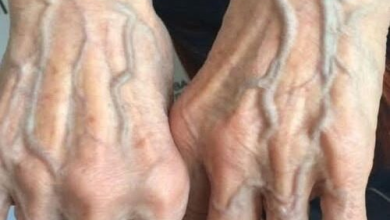“After a Night Shift, I Fell Asleep at the Laundromat with My Baby — Opening the Washer Left Me Speechless”

After working an exhausting night shift at the pharmacy, I dragged myself to the laundromat with Willow, my seven-month-old daughter, sleeping heavily against my shoulder. I was so worn out that I nodded off while the washer rumbled. When I eventually jolted awake, my laundry sat neatly folded—but something inside the washer made my stomach drop.
I’ve been picking up every extra shift I can. When someone calls in sick or the store’s short-staffed, I volunteer, even if it means I barely sleep. The additional pay is the only reason I can afford formula, diapers, and the endless list of things a baby needs.
Willow is seven and a half months old, soft and warm and smelling like baby lotion and sunlight. One smile from her can crack through even my worst day. Her father bailed the moment I told him I was pregnant.
“I’m not ready to be a dad,” he said, as if fatherhood was something he could shrug off like an itchy sweater. By the time my pregnancy reached the halfway mark, I stopped hoping for a text from him.
Now it’s just me, my mom, and Willow—our tiny three-person team. My mom watches Willow while I work, even though she’s 61 and already did all of this once. I tell myself the heavy feeling in my chest is gratitude, not guilt.
Our apartment is small and old, a two-story walk-up with thin walls and a permanently leaky faucet. The rent is manageable, but there’s no washer or dryer. Laundry piles up fast, and I usually end up hauling it down the street to the laundromat with its flickering neon sign and floors that always feel slightly tacky.
That morning, after my shift, I walked inside barely able to keep my eyes open. The laundry basket overflowed. Willow dozed in her jacket, tiny fists curled under her chin.
“We’ve got to get this done, baby,” I whispered.
Mom was still asleep when I left. She’d been up half the night with Willow while I worked, and I didn’t want to wake her.
The laundromat was almost empty—just the low hum of machines and the familiar scent of detergent. A woman in her fifties was unloading a dryer. She glanced over, smiled, and said, “Your little girl is precious.”
“Thank you,” I murmured.
After she left, the place went quiet. I loaded everything into one washer—my uniforms, Willow’s onesies, towels, and her little elephant blanket. I fed in the last of my quarters, pressed start, and sat down in one of the hard plastic chairs.
Willow fussed, so I rocked her gently. I didn’t have a clean blanket, so I grabbed one from the dirty pile and wrapped her carefully. She sighed, settled against me, and the weight of exhaustion pressed down.
Just for a second, I told myself. Just a moment.
Then I fell asleep.
When I opened my eyes, the sun was cutting across the floor in bright slants. Panic shot through me. Willow was still nestled in my arms, safe—but something felt off.
The washers had stopped. The place was silent.
And on the folding table beside me was my laundry. Folded. Perfectly. Every shirt, every towel, even Willow’s tiny socks paired up.
My breath caught. I looked around—no one.
Then I saw the washer I’d used. The door was shut. Inside, through the glass, wasn’t my laundry.
It was full of supplies.
Diapers. Wipes. Two cans of formula. A plush elephant. A soft fleece blanket. And on top, a folded note.
“For you and your little girl. — J.”
My hands trembled as I opened it. The handwriting was neat and simple. Whoever “J” was, they were long gone.
All I could do was sit there, staring at the note, the tears blurring the words. Someone noticed. Someone cared.
When I got home and Mom saw everything, she pressed a hand to her mouth.
“There are still good hearts out there,” she whispered.
I stuck the note on the fridge with our sunflower magnet. Every time I passed it, something inside me eased.
A week later, after a brutal double shift, I climbed the stairs to find a wicker basket at our door. Inside: groceries, baby food, oatmeal, fruit, crackers. And another note—same careful handwriting:
“You’re stronger than you know. Keep going. — J.”
I cried and laughed at the same time, not sure which feeling was stronger.
Who was this person? And how did they know exactly what we needed?
That night, once Mom and Willow were asleep, I wrote a small note and tucked it under our doormat:
“Thank you. Please tell me who you are. I want to thank you properly.”
Days passed with no answer.
Then one morning, as I approached the building, I saw a man near the gate, shifting awkwardly.
“Harper?” he asked.
I stopped. “Jaxon?”
He nodded.
Suddenly, the pieces came together. Jaxon—the quiet, shy kid from high school who everyone bullied. The boy I used to defend when no one else would.
“You helped me once,” he said softly. “I never forgot. I just wanted to return the kindness.”
Tears stung my eyes. I didn’t know what to say. Gratitude felt too small.
Jaxon started stopping by now and then—bringing diapers or groceries, helping fix little things around the apartment. He never pushed for more, never asked for anything. Mom started calling him “Uncle J,” and strangely, it fit. There was no romance, just a steady, gentle presence.
Months passed, and one day my boss offered me consistent hours and a raise. When I asked how he’d heard so much about my work ethic, he only smiled.
I didn’t need the answer. I already knew who had spoken up for me.
At home, I glanced at the note on the fridge:
“For you and your little girl. — J.”
A wave of emotion washed over me. Sometimes the kindness you gave years ago circles back quietly, unexpectedly, and exactly when you need it most.
Jaxon didn’t just help keep us afloat.
He reminded me that compassion has a way of finding its way home.




